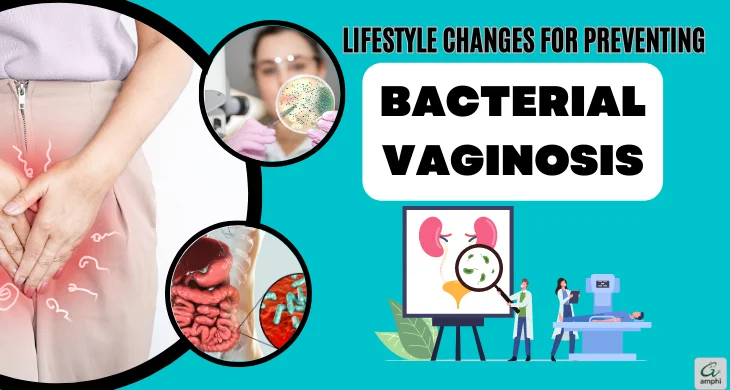Ensuring optimal vaginal health is vital for overall wellness. Bacterial vaginosis (BV) is a common vaginal infection that can cause discomfort and disrupt vaginal balance. While medical treatment is important, adopting certain lifestyle changes can play a significant role in preventing BV and promoting a healthy vaginal environment. This comprehensive blog explores a range of lifestyle adjustments, from hygiene practices to dietary choices, that can help prevent bacterial vaginosis and support long-term vaginal health.
What is Bacterial Vaginosis?
Bacterial Vaginosis (BV) is a common vaginal infection characterized by an imbalance in the natural bacterial flora of the vagina. It occurs when the normal balance of “good” and “harmful” bacteria is disrupted, leading to an overgrowth of certain bacteria. BV can cause symptoms such as unusual vaginal discharge, itching, a strong fishy odor, and discomfort. While it’s not typically a serious condition, it can increase the risk of complications like pelvic inflammatory disease (PID) if left untreated. Medical evaluation and appropriate treatment are important to manage BV and restore vaginal health.
Causes of Bacterial Vaginosis:
The exact cause of Bacterial Vaginosis (BV) is not fully understood, but it is believed to result from an imbalance in the vaginal bacteria. Normally, the vagina contains a mix of “good” and “harmful” bacteria in a balanced state. Several factors can disrupt this balance and contribute to the development of BV:
- Bacterial Imbalance: BV occurs when there is an overgrowth of harmful bacteria (e.g., Gardnerella vaginalis) and a decrease in beneficial bacteria (Lactobacilli) in the vaginal ecosystem.
- Sexual Activity: Engaging in sexual activity, especially with new or multiple partners, can disrupt the vaginal pH and bacterial balance, increasing the risk of BV. However, BV can also occur in individuals who are not sexually active.
- Douching: Douching disrupts the natural pH of the vagina and can remove the beneficial bacteria, making the vaginal environment more susceptible to BV.
- Use of Scented Products: Using scented soaps, feminine hygiene products, and perfumed sprays in the vaginal area can irritate the delicate balance of bacteria and contribute to BV.
- Hormonal fluctuations: like those experienced during menstruation, pregnancy, or menopause, can impact the vaginal environment and heighten the risk of BV.
- Antibiotics: While antibiotics are used to treat bacterial infections, they can also disrupt the vaginal bacterial balance, potentially leading to BV.
- Smoking: Smoking has been associated with an increased risk of BV, possibly due to its impact on the vaginal microbiome.
Lifestyle Changes for Preventing Bacterial Vaginosis:
1. Hygiene Habits: Practicing proper hygiene is crucial. Avoid using harsh soaps, scented products, and douches, as they can disturb the vaginal pH balance. Instead, opt for mild, fragrance-free products and wash the vaginal area with water.
2. Cotton Underwear: Wearing breathable cotton underwear helps maintain a dry environment and prevents moisture buildup, reducing the risk of BV. Avoid tight-fitting synthetic materials that trap heat and moisture.
3. Proper Wiping Technique: Always wipe from front to back after using the toilet to prevent the spread of bacteria from the anal area to the vagina.
4. Avoid Irritants: Avoid using scented tampons, pads, and toilet paper, as they can cause irritation and disrupt the vaginal flora.
5. Sexual Practices: Practicing safe sex and using condoms can help prevent the introduction of harmful bacteria into the vagina. After intercourse, urinate and clean the genital area to reduce the risk of infection.
6. Balanced Diet: Eating a balanced diet rich in nutrients supports overall health, including vaginal health. Incorporate foods rich in probiotics, such as yogurt and fermented foods, to promote a healthy vaginal microbiome.
7. Stay Hydrated: Adequate water intake is essential for maintaining vaginal moisture and preventing dryness that can lead to irritation.
8. Manage Stress: Chronic stress can impact the body’s immune response and increase vulnerability to infections. Participate in stress-relieving practices such as meditation, yoga, or deep breathing exercises.
9. Avoid Over washing: Over washing the vaginal area can disrupt the natural pH balance. Limit washing to once or twice a day using gentle, pH-balanced cleansers.
10. Regular Check-ups: Regular gynecological check-ups help monitor vaginal health and detect any potential issues early.
11. Avoid Tight Clothing: Wearing tight-fitting clothing can trap heat and moisture, creating an environment conducive to bacterial overgrowth. Opt for loose-fitting attire.
12. Limit Sugar Intake: Excessive sugar consumption can contribute to imbalances in the body, potentially affecting vaginal health. Maintain a balanced sugar intake.
Frequently Asked Questions:
Ques: Can lifestyle changes really prevent bacterial vaginosis (BV)?
Ans: While lifestyle changes cannot guarantee complete prevention, they play a significant role in reducing the risk of BV. By maintaining vaginal health through proper hygiene, diet, and habits, you can create an environment that is less conducive to BV development.
Ques: Are there specific hygiene practices to prevent BV?
Ans: Yes, maintaining proper hygiene is essential. Avoid using scented products, harsh soaps, and douches. Practice gentle cleansing with water and mild, fragrance-free products.
Ques: Can wearing certain fabrics impact BV risk?
Ans: Yes, wearing breathable cotton underwear can help prevent BV by reducing moisture buildup.
Ques: Is it necessary to change sexual practices to prevent BV?
Ans: Practicing safe sex and using condoms can reduce the risk of introducing harmful bacteria. After intercourse, urinating and cleaning the genital area can also help prevent infections.
Ques: How can diet influence BV prevention?
Ans: Eating a balanced diet rich in nutrients, including probiotics, supports vaginal health. Probiotic-rich foods like yogurt and fermented products promote a healthy vaginal microbiome.
Ques: Can stress impact BV risk?
Ans: Chronic stress can weaken the immune system, making the body more susceptible to infections. Managing stress through relaxation techniques can indirectly contribute to BV prevention.
Conclusion:
By incorporating these lifestyle changes into your daily routine, you can take proactive steps to prevent bacterial vaginosis and promote optimal vaginal health. Remember that individual needs may vary, and consulting a healthcare professional is advisable for personalized guidance. Prioritizing vaginal well-being through mindful lifestyle choices contributes to a healthier, happier you.

